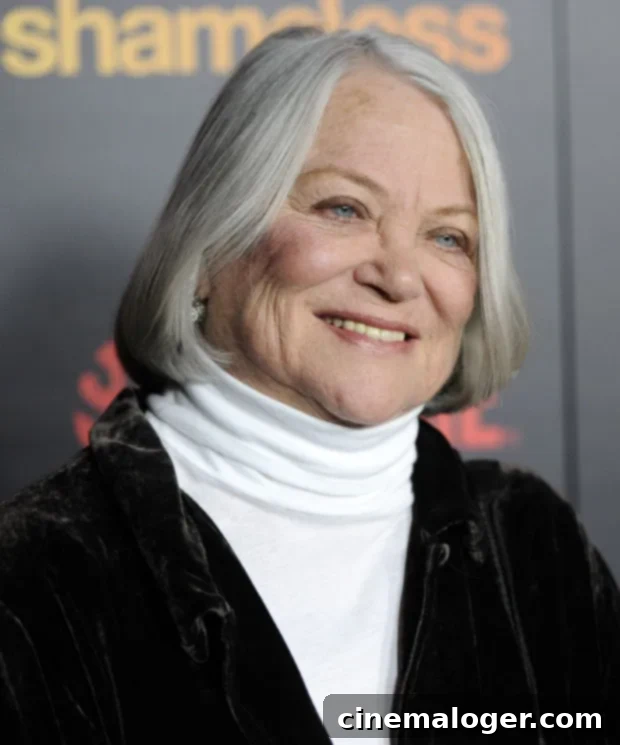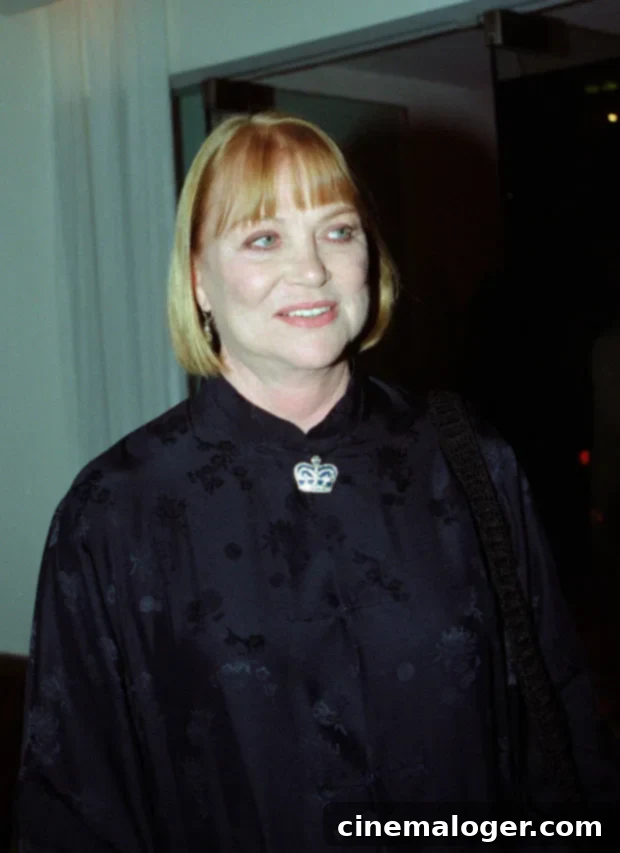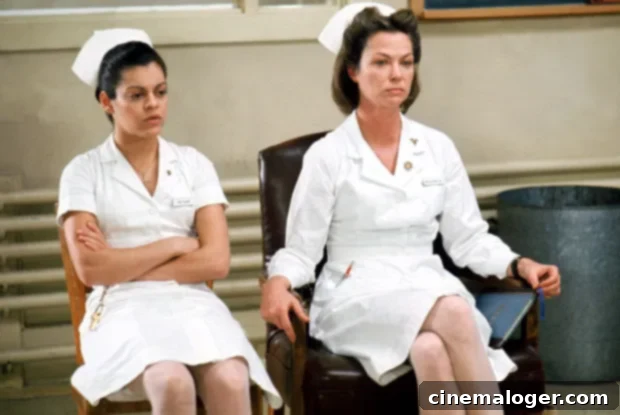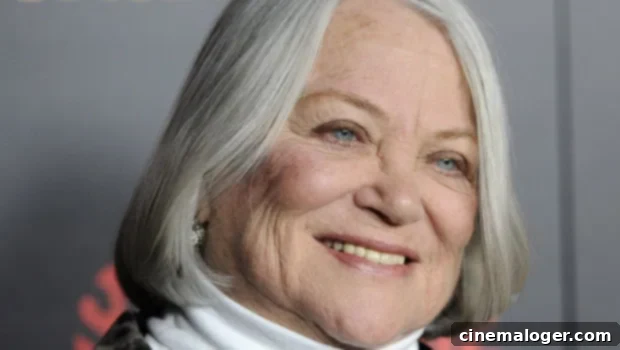Louise Fletcher: The Timeless Legacy of Hollywood’s Iconic Nurse Ratched and Her Unforgettable Journey
Hollywood recently bid a fond farewell to one of its most compelling and unique talents, Louise Fletcher, who passed away peacefully at her home in Montdurausse, France, on Saturday, September 24, at the age of 88. Her passing marks the end of an extraordinary life and career that captivated audiences for decades, leaving an indelible mark on cinematic history, most notably through her portrayal of one of film’s most chilling antagonists.
Fletcher was a true anomaly in the glittering world of Tinseltown, achieving widespread fame and critical acclaim much later in life. Her journey was particularly remarkable as she intentionally paused her burgeoning acting career for over a decade to dedicate herself to raising her family. When she eventually made her triumphant return to the silver screen in 1975, at the age of 41 and relatively unknown to mainstream audiences, it was with an explosive impact that reverberated through the industry. Her electrifying performance as the icily formidable Nurse Mildred Ratched in Milos Forman’s groundbreaking film, One Flew Over the Cuckoo’s Nest, not only redefined the cinematic villain but also earned her the coveted Academy Award for Best Actress. This singular role cemented her status as a Hollywood legend, depicting a character whose chilling stoicism and quiet cruelty made the life of Jack Nicholson’s rebellious Randle McMurphy a living hell within the confines of a mental institution.

Fletcher’s uncanny ability to embody such a complex and deeply unsettling character, coupled with her unique personal narrative, has ensured her enduring presence in the pantheon of Hollywood greats. Her career trajectory serves as an inspiring testament to perseverance, talent, and the power of returning to one’s passion. Below, we delve deeper into the fascinating life and remarkable career of this beloved actress, exploring the pivotal moments and personal experiences that shaped her into the icon we remember.
1. Louise Fletcher’s Early Life and Entry into Acting
Born on July 22, 1934, in Birmingham, Alabama, Estelle Louise Fletcher navigated a unique path to Hollywood stardom. Her early years laid the foundation for the resilience and depth she would later bring to her roles. After completing her high school education, Louise pursued higher learning, choosing to study drama at North Carolina State University. This academic pursuit honed her natural acting abilities and ignited a passion for performance that would guide her professional aspirations.
Upon graduating, Fletcher made the ambitious move to Los Angeles, the undisputed heart of the American film and television industry, to embark on her acting career. Like many aspiring actors in Hollywood, her journey was far from an overnight success. To support herself while pursuing her dreams, she took on a job as a receptionist during the day, dedicating her evenings to meticulously studying her craft. This period of balancing work with intensive acting classes and auditions was crucial, allowing her to develop a strong foundation and gain invaluable experience. Her persistence eventually paid off, leading to her first small roles in various television series, gradually building her resume and experience in front of the camera, as chronicled by NPR. These initial roles, though minor, provided her with the crucial exposure and practical experience needed to navigate the competitive landscape of show business, preparing her for the bigger challenges that lay ahead.
2. The Profound Influence of Her Deaf Parents

A deeply personal aspect of Louise Fletcher’s life, and one that undoubtedly shaped her unique perspective and the profound empathy she brought to her craft, was her upbringing with deaf parents. Her mother, Estelle, was born deaf, while her father, the Reverend Robert Capers Fletcher, a dedicated Episcopalian minister, tragically lost his hearing at the tender age of four after being struck by lightning. This unique family dynamic meant that communication within their household often relied on sign language, fostering in Louise a keen sensitivity to non-verbal cues and a profound understanding of the challenges faced by those living with disabilities.
Fletcher herself reflected on this experience in a revealing 1982 interview, stating, “It was like having parents who are immigrants who don’t speak your language.” This poignant analogy highlights the sense of otherness and the constant bridging of communication gaps that defined her childhood. Living in a world where her primary caregivers communicated differently instilled in her a unique form of resilience, patience, and a heightened ability to observe and interpret emotions and intentions beyond spoken words. These qualities, though developed in a personal context, proved invaluable in her acting career, allowing her to portray complex characters with subtle nuances and a deep sense of internal life. Her experience undoubtedly contributed to her ability to convey powerful emotions with minimal dialogue, a hallmark of her most iconic performance as Nurse Ratched.
3. The Genesis of an Icon: How Louise Fletcher Became Nurse Ratched
The role that would define Louise Fletcher’s career and forever etch her name into cinematic history, Nurse Ratched in One Flew Over the Cuckoo’s Nest, has a fascinating backstory regarding its casting. The film itself, directed by the visionary Milos Forman, was set and filmed in 1974 at the real-life Oregon State Hospital, a psychiatric institution, lending an unparalleled authenticity to its gritty narrative. Based on Ken Kesey’s seminal 1962 novel of the same name, the movie transcended its source material to become an immediate critical and commercial success.
One Flew Over the Cuckoo’s Nest achieved a rare and historic feat at the Academy Awards, becoming the first film since 1934’s It Happened One Night to win all “Big Five” Oscars: Best Picture, Best Director, Best Actor (for Jack Nicholson), Best Actress (for Louise Fletcher), and Best Screenplay (Adapted). This extraordinary achievement cemented its place as a cinematic masterpiece, a distinction shared only once more, by The Silence of the Lambs in 1991. The film’s powerful themes of rebellion against authority, the dehumanizing aspects of institutionalization, and the definition of sanity continue to resonate deeply with audiences worldwide.
Milos Forman, known for his unconventional casting choices, had been impressed by Louise Fletcher’s performance the year prior in director Robert Altman’s crime drama, Thieves Like Us. He recognized her quiet intensity and understated power, qualities he believed would be perfect for the seemingly benevolent yet deeply sinister Nurse Ratched. However, securing the right actress for this pivotal role was a significant challenge. The part had been initially offered to several prominent stars of the era, including established actresses like Anne Bancroft, Ellen Burstyn, and Angela Lansbury. Each, for various reasons, declined the role, perhaps wary of embodying such an unsympathetic and truly despicable character.
Louise Fletcher was, by her own admission, the last person considered for the part, a fact she humorously recounted in a 2004 interview, as reported by NPR. “I was the last person cast,” she revealed. “It wasn’t until we were halfway through shooting that I realized the part had been offered to other actresses who didn’t want to appear so horrible on the screen.” This hesitation from other actresses inadvertently opened the door for Fletcher, whose willingness to embrace the chilling depths of Ratched’s psyche allowed her to create a performance that was both terrifyingly cold and tragically human. Her portrayal of Ratched was not overtly villainous; instead, it was the subtle, insidious control and the bureaucratic cruelty that made the character so profoundly disturbing and unforgettable. Fletcher’s performance perfectly balanced the character’s outward composure with her inner malevolence, a nuanced approach that elevated Ratched beyond a simple antagonist to an enduring symbol of oppressive authority.

4. Louise Fletcher’s Historic Oscar Speech: A Tribute in Sign Language
The culmination of Louise Fletcher’s incredible performance in One Flew Over the Cuckoo’s Nest came on Oscar night, when she was awarded the Best Actress Academy Award. It was a moment of profound personal and professional triumph, made even more memorable and historically significant by her heartfelt acceptance speech. As she stood on stage, holding her golden statue, Fletcher chose a powerful and deeply personal way to express her gratitude. Instead of solely speaking, she turned her attention to her parents, who were watching from the audience, and addressed them directly using American Sign Language.
In a deeply moving and unprecedented gesture, she signed her thanks to her deaf parents, conveying words that resonated far beyond the Hollywood ceremony: “I want to thank you for teaching me to have a dream. You are seeing my dream come true.” This extraordinary moment captivated the audience and viewers worldwide, not only for its emotional authenticity but also for its profound representation. It was a rare public acknowledgment of the deaf community and a beautiful testament to the unique bond she shared with her parents. Her sign language speech transcended the typical Oscar thank-you, becoming a powerful statement of love, gratitude, and the fulfillment of a lifelong ambition, demonstrating the depth of her character both on and off screen.
5. An 11-Year Hiatus: Prioritizing Family Over Career
One of the most unique and admirable aspects of Louise Fletcher’s career trajectory was her deliberate decision to step away from acting for a significant period. In the early 1960s, after marrying Jerry Bick, a film producer, and welcoming their two sons, John and Andrew, Louise made the choice that many women of her generation faced: to prioritize family over career. She decided to put her nascent acting career on hold to focus entirely on raising her children, a temporary hiatus that ultimately spanned 11 years.
This long break, occurring during what would typically be a crucial period for career advancement in Hollywood, speaks volumes about her values and commitment to her family. In the same 2004 interview reported by NPR, Fletcher reflected on this pivotal decision: “I made the choice to stop working, but I didn’t see it as a choice. I felt compelled to stay at home.” This sentiment reflects the societal pressures and personal desires that often guided women’s decisions during that era. While it meant sacrificing prime years in a highly competitive industry, her return to acting in her early 40s with a role as demanding and iconic as Nurse Ratched proved that talent, dedication, and a compelling story can indeed triumph over conventional career paths. Her comeback was not just a personal victory but also an inspiring narrative for anyone contemplating a return to their passions after a period of dedication to family.
Following her Oscar win, Fletcher continued to build a diverse and respected career, proving her versatility beyond the shadow of Nurse Ratched. She tackled roles in science fiction, notably as Kai Winn Adami in Star Trek: Deep Space Nine, a recurring antagonist who showcased her ability to embody complex, morally ambiguous characters. She also appeared in films like Exorcist II: The Heretic and Flowers in the Attic, demonstrating her range across various genres. Louise Fletcher’s life and career serve as a powerful reminder that success can be found at any age and that personal choices, even those that seem to diverge from the norm, can ultimately lead to extraordinary achievements and an enduring legacy in the annals of cinema.
